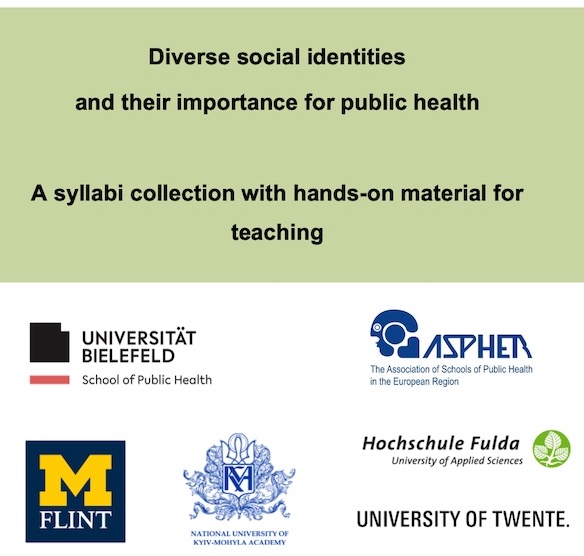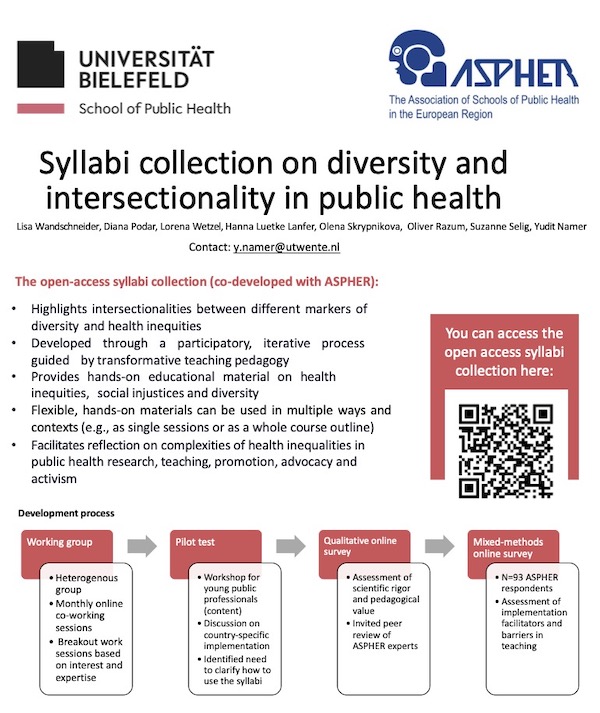Diverse social identities and their importance for public health:
A syllabi collection with hands-on material for teaching
 Members of minoritised population groups are exposed to higher burdens of morbidity and mortality and face barriers to accessing health care systems and other critical resources to achieve optimal health. Intersectional perspectives that emphasise the dimensions of social power and discrimination are just beginning to emerge in public health research. These perspectives contextualise longstanding patterns of health inequalities but are rarely translated into public health curricula. Concepts like “cultural competence” or “diversity, equity and inclusion” do address the importance of awareness and respect for (cultural) diversity in (patient/client) populations. The research and teaching examples available are largely limited to a USA context, tend to consider specific identities, rather than intersectional characteristics, are not systematically integrated in public health curricula and are usually not rooted in a theoretical approach of teaching. It is imperative that Europe bridges the knowledge-to-teaching gap and begins introducing similar programs, while learning from the limitations of USA efforts. Two steps are needed to strengthen public health educational institutions and improve population health: first, to systematically incorporate an intersectional paradigm into public health curricula; and second, to provide faculty members in public health programs with transformative teaching skills (Namer & Wandschneider, 2021).
Members of minoritised population groups are exposed to higher burdens of morbidity and mortality and face barriers to accessing health care systems and other critical resources to achieve optimal health. Intersectional perspectives that emphasise the dimensions of social power and discrimination are just beginning to emerge in public health research. These perspectives contextualise longstanding patterns of health inequalities but are rarely translated into public health curricula. Concepts like “cultural competence” or “diversity, equity and inclusion” do address the importance of awareness and respect for (cultural) diversity in (patient/client) populations. The research and teaching examples available are largely limited to a USA context, tend to consider specific identities, rather than intersectional characteristics, are not systematically integrated in public health curricula and are usually not rooted in a theoretical approach of teaching. It is imperative that Europe bridges the knowledge-to-teaching gap and begins introducing similar programs, while learning from the limitations of USA efforts. Two steps are needed to strengthen public health educational institutions and improve population health: first, to systematically incorporate an intersectional paradigm into public health curricula; and second, to provide faculty members in public health programs with transformative teaching skills (Namer & Wandschneider, 2021).
In advocating for the improvement of public health education in Europe, ASPHER fully endorses the need to bring diversity more into the focus of teaching. ASPHER therefore developed a policy on diversity competence to be an element of the ASPHER 2025 strategy. This approach goes beyond the notion of cultural diversity as ASPHER envisages an intersectional, holistic notion to reflect on multiple dimensions of diversity that affect the health of populations (Wandschneider et al., 2020).
 Aim:
Aim:
The overall aim of the syllabi is to help establish a teaching program encouraging the reconsideration of normativities within public health while highlighting the intersectionalities between different markers of diversity. The teaching programme adopts a transformative learning approach to contribute to higher sensitivity toward diversity and simultaneously higher standards of European public health education and training (Wandschneider et al., 2020).
In a nutshell, these syllabi provide hands-on material for people engaged in public health education on health inequities, social injustices and diversity.
The syllabi enable students to
- identify mechanisms of privilege and oppression related to social identities,
- determine awareness of one’s own social identities and their relevance in the public health landscape,
- learn how to determine biases within public health structures (and oneself),
- address and change biases in their practices to ultimately reduce health inequities.
The syllabi can potentially strengthen the capacities of future public health professionals to acknowledge the relevance of social identities and how to respond effectively to contribute to health equity (Wandschneider et al., 2021).





